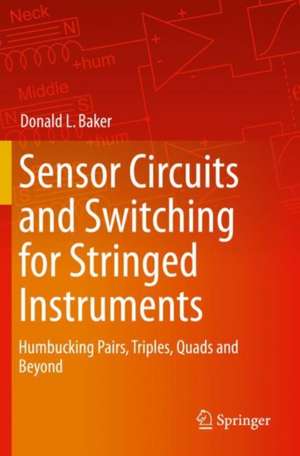Sensor Circuits and Switching for Stringed Instruments: Humbucking Pairs, Triples, Quads and Beyond
Autor Donald L. Bakeren Limba Engleză Paperback – 26 aug 2021
The discussion continues, developing humbucking circuits for odd numbers of matched single-coil pickups, extendable to any odd or even number, greater than 1, using a simplified switching system with very simple rules. It abandons some tones in favor of producing all-humbucking and unique tones, no matter what the switching choice. The author discloses both mechanical and digital switching versions. Then, based on using humbucking basis vectors, the author discloses variable-gain circuits that duplicate all possible switched humbucking tone circuits, and produces all the continuous tone gradations in between. The presentation includes analog and digitally controlled systems. The object of all the disclosures: give the guitarist or pianist a system which allows going from bright to warm tones and back, without ever needing to know which pickups are used in what combination.
| Toate formatele și edițiile | Preț | Express |
|---|---|---|
| Paperback (1) | 385.08 lei 6-8 săpt. | |
| Springer International Publishing – 26 aug 2021 | 385.08 lei 6-8 săpt. | |
| Hardback (1) | 392.37 lei 6-8 săpt. | |
| Springer International Publishing – 15 mar 2020 | 392.37 lei 6-8 săpt. |
Preț: 385.08 lei
Nou
Puncte Express: 578
Preț estimativ în valută:
73.69€ • 76.13$ • 61.33£
73.69€ • 76.13$ • 61.33£
Carte tipărită la comandă
Livrare economică 25 martie-08 aprilie
Preluare comenzi: 021 569.72.76
Specificații
ISBN-13: 9783030231262
ISBN-10: 3030231267
Pagini: 231
Ilustrații: XII, 231 p. 125 illus., 13 illus. in color.
Dimensiuni: 155 x 235 mm
Greutate: 0.35 kg
Ediția:1st ed. 2020
Editura: Springer International Publishing
Colecția Springer
Locul publicării:Cham, Switzerland
ISBN-10: 3030231267
Pagini: 231
Ilustrații: XII, 231 p. 125 illus., 13 illus. in color.
Dimensiuni: 155 x 235 mm
Greutate: 0.35 kg
Ediția:1st ed. 2020
Editura: Springer International Publishing
Colecția Springer
Locul publicării:Cham, Switzerland
Cuprins
Chapter 1. Introduction and Short Previews of Coming Chapters.- Chapter 2. Series-Parallel Circuit Topologies of Single Sensors.- Chapter 3. Series-Parallel Circuit Topologies of Humbucking Pickups.- Chapter 4. Series-Parallel Circuit Topologies of Matched Single-Coil Pickups.- Chapter 5. The Limits of Mechanical Switches.- Chapter 6. An Efficient uC-controlled Cross-Point Pickup Switching System.- Chapter 7. The Tonal Advantages of Pickups with Reversible Magnets.- Chapter 8. Common Connection Point Humbucking Circuits with Odd and Even Numbers of Matched Single-Coil Pickups.- Chapter 9. A Common-Point Connection Experiment With Two Mini-Humbuckers.- Chapter 10. Switching Systems for Common-Point Connection Pickup Circuits.- Chapter 11. Humbucking Basis Vectors – Tones Without Switching.
Notă biografică
Dr. Baker, raised in a military family and currently retired, has lived has lived in 12 U.S. states from Hawaii to Massachusetts and Illinois to Florida, has degrees in E.E., Ocean Engr, Agronomy and Soil Science from M.I.T., Cambridge, U.Mass., Amherst, and Colorado St. U., Ft. Collins, with transcript courses from U. of Ark., Fayetteville and U. of New Orleans. He has been an Electronics Engineer and Scientist, has authored papers appearing or noted on aquarien.com, academia.com and ResearchGate.net, and is the author, owner and site manager of aquarien.com, android-originals.com, theandroidsaxe.com and TulsaSoundGuitars.com. He also has a long-time interest in the art of photography, having taken courses inthe M.I.T. Photo Lab of Minor White, past editor of Aperture. He currently relaxes by turning wood pens with homemade lathe tools, and has recently bought a rowing machine.
Textul de pe ultima copertă
This book presents new methods of circuit design for guitar electronics, based directly upon U.S. Non-Provisional Patent Applications. By systematic construction of unique series-parallel circuit topologies, the author shows how many series-parallel circuits are possible, including non-matched single-coil pickups, humbucking pickups, and humbucking combinations of matched single-coil pickups. This allows designers to avoid unnecessary and confusing duplicate circuits in pickup switching systems. It shows how electromechanical switches cannot produce the maximum number of tones for more than 2 or 3 pickups. Thus the author discloses an efficient micro-controller and cross-point switch architecture to replace mechanical switches, and allow access to the maximum number of tones.
The discussion continues, developing humbucking circuits for odd numbers of matched single-coil pickups, extendable to any odd or even number, greaterthan 1, using a simplified switching system with very simple rules. It abandons some tones in favor of producing all-humbucking and unique tones, no matter what the switching choice. The author discloses both mechanical and digital switching versions. Then, based on using humbucking basis vectors, the author discloses variable-gain circuits that duplicate all possible switched humbucking tone circuits, and produces all the continuous tone gradations in between. The presentation includes analog and digitally controlled systems. The object of all the disclosures: give the guitarist or pianist a system which allows going from bright to warm tones and back, without ever needing to know which pickups are used in what combination.
Caracteristici
Provides readers with an in-depth preview of advanced concepts and products for electric stringed instrument, especially guitar, pickup circuit design Explains concepts and products in a linear, tutorial manner, using tables, equations and figures to enhance presentation Shows a logical and efficient way to use digital pickup switching, while maintaining an analog signal path between the strings and final guitar amplifier Demonstrates the topologies of pickup circuits necessary to avoid overly complicated switching designs with redundant choices Demonstrates how all humbucking pickup tones can be reproduced and analyzed with the spectral frequency distributions of a few, defined by humbucking basis vectors
